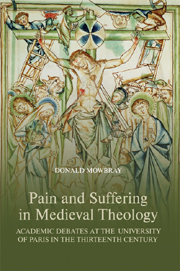 Pain and Suffering in Medieval Theology
Pain and Suffering in Medieval Theology Book contents
- Frontmatter
- Contents
- Acknowledgements
- Abbreviations
- Dedication
- Introduction
- 1 Thirteenth-Century Theological Ideas about Human Pain and Suffering and the Passion of Christ
- 2 Gendering Pain: Theological Ideas about Female and Male Suffering
- 3 Pain as a Restorative Power: Voluntary Suffering and Satisfaction for Sin
- 4 The Intellectual Development of Limbo: Pain, Children and Original Sin
- 5 Anima Separata: Masters of Theology and the Controversy surrounding the Suffering of the Separated Soul
- 6 Defining the Corporeal: Suffering in Hell according to Masters of Theology at Paris, c.1230–c.1280
- Conclusion
- Select Bibliography
- Index
6 - Defining the Corporeal: Suffering in Hell according to Masters of Theology at Paris, c.1230–c.1280
Published online by Cambridge University Press: 12 September 2012
- Frontmatter
- Contents
- Acknowledgements
- Abbreviations
- Dedication
- Introduction
- 1 Thirteenth-Century Theological Ideas about Human Pain and Suffering and the Passion of Christ
- 2 Gendering Pain: Theological Ideas about Female and Male Suffering
- 3 Pain as a Restorative Power: Voluntary Suffering and Satisfaction for Sin
- 4 The Intellectual Development of Limbo: Pain, Children and Original Sin
- 5 Anima Separata: Masters of Theology and the Controversy surrounding the Suffering of the Separated Soul
- 6 Defining the Corporeal: Suffering in Hell according to Masters of Theology at Paris, c.1230–c.1280
- Conclusion
- Select Bibliography
- Index
Summary
The previous chapter explained how masters of theology grappled with the suffering of the disembodied soul in the afterlife. However, pain and suffering in hell also involved corporeal suffering after resurrection. Defining the nature of corporeality in hell and its relation to eternal suffering was thus an important concern for the masters. What prompted the masters to debate specific questions about corporeal suffering in hell? One reason they asked questions about the bodies of the damned was because certain passages of scripture were traditionally held to be significant where the suffering of the body in hell was concerned. Furthermore, in many instances, the nature of different kinds of punishment was disputed or left ambiguous in later commentaries by key authorities. As has been seen throughout, part of the métier of a theologian was to resolve apparent conflicts in his main authorities. However, by debating these issues themselves, other debates and questions arose as a logical consequence. In discussing the natures of the fires of hell and the nature of mental anguish caused by the worm of conscience, for example, theologians wanted to know which would cause most suffering to the damned. The types of suffering in hell were also important concerns for they had significance to Church teaching outside the university. The first part of this chapter examines the intellectual understanding of the nature of pain in hell.
The resurrection of the body also had its part to play in discussion of the afterlife. The issue of the continuity of the selfsame person, evident in so many treatises on resurrection through the centuries, influenced debate on the nature of the resurrected body itself. The masters asked whether bodily deformities would remain after death because the maintenance of personal continuity of the selfsame body was steeped in tradition. New theories imbued with Aristotelian influences caused this issue to be vigorously debated. The second part of this chapter examines the nature of the resurrected body in hell as the backdrop to intellectual discussions of how the resurrected body could be said to suffer for eternity.
- Type
- Chapter
- Information
- Pain and Suffering in Medieval TheologyAcademic Debates at the University of Paris in the Thirteenth Century, pp. 131 - 158Publisher: Boydell & BrewerPrint publication year: 2009


